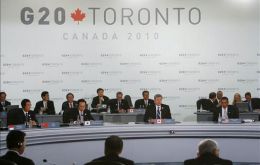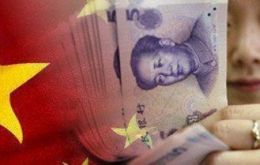MercoPress. South Atlantic News Agency
Economy
-
Tuesday, June 29th 2010 - 05:40 UTC
Boosted by agriculture Paraguay set to expand 6% in 2010

Paraguay expects an annual growth of 5% by the end of President Fernando Lugo’s administration which finishes in 2013 and inflation should not be higher than one digit said Economy Minister Dionisio Borda.
-
Tuesday, June 29th 2010 - 05:30 UTC
Brazil to implement new banking reserve requirements bases on Basel Index

Brazil's government will implement new reserve requirements on credit operations undertaken by the nation's banks, in compliance with the latest changes in the Basel Index, by 2012, the Central Bank of Brazil said in a statement Monday.
-
Tuesday, June 29th 2010 - 05:25 UTC
Fitch lifts Brazil’s credit rating to investment-grade; further ‘improvement’ needed

Brazil’s credit rating outlook was boosted to positive from stable by Fitch Ratings, which cited the country’s “growth dynamics” and “prudent” policies. Fitch rates Brazil BBB-, the lowest investment-grade rating and in line with rankings from Standard & Poor’s and Moody’s Investors Service.
-
Tuesday, June 29th 2010 - 05:04 UTC
European crisis ‘key risk’ for UK banking sector, warns Bank of England

The European debt crisis is a “key risk” to the UK's banking sector and banks should build up their cash reserves in response, the Bank of England has warned. In its latest financial stability report, the central bank welcomed recent measures taken by the EU to stem the crisis.
-
Monday, June 28th 2010 - 22:19 UTC
Greece wants Mercosur/EU talks conditioned to end of Argentine trade barriers

On the eve of the resumption of European Union/Mercosur trade talks, the EU has again complained about Argentina’s ‘protectionist’ measures on some EU agriculture produce and Greece is demanding discussions be conditioned to an end to barriers.
-
Monday, June 28th 2010 - 22:08 UTC
US ratings agency down-plays success of Argentina’s debt-swap deal

US ratings agency Moody's said that Argentina's debt-swap is unlikely to improve the liquidity profile for corporate issuers even when the highest-rated companies will be able to tap international debt markets and lengthen their debt maturity profiles.
-
Monday, June 28th 2010 - 05:48 UTC
Chile has become a producer and exporter of premium Wagyu (Kobe) beef

The traditional rivalry between Chile and Argentina is likely to be turned up a notch with the news that Chile could be soon challenging its meat-famous neighbour with the quality of its beef.
-
Monday, June 28th 2010 - 05:45 UTC
Netherlands and Uruguay to sign treaty for exchange of fiscal data

The Netherlands is planning to exchange fiscal data in future with Uruguay, Mauritius and Brunei, reports the Dutch press.
-
Monday, June 28th 2010 - 05:42 UTC
China’s central bank assesses steps to make the Yuan a global currency

China must create more channels for investors and companies to use the Yuan if it wants to internationalize the currency and put it on a par with the Yen and the Euro, central bank officials and economists told a forum in Shanghai.
-
Monday, June 28th 2010 - 05:35 UTC
NZ Farming needs 60 million USD to complete dairy investment in Uruguay

New Zealand Farming Systems Uruguay needs to raise about 60 million US dollars to complete the development of the company, says Chairman John Parker. The company was set up to develop dairy-farm operations in Uruguay and floated on the NZX in 2007.
